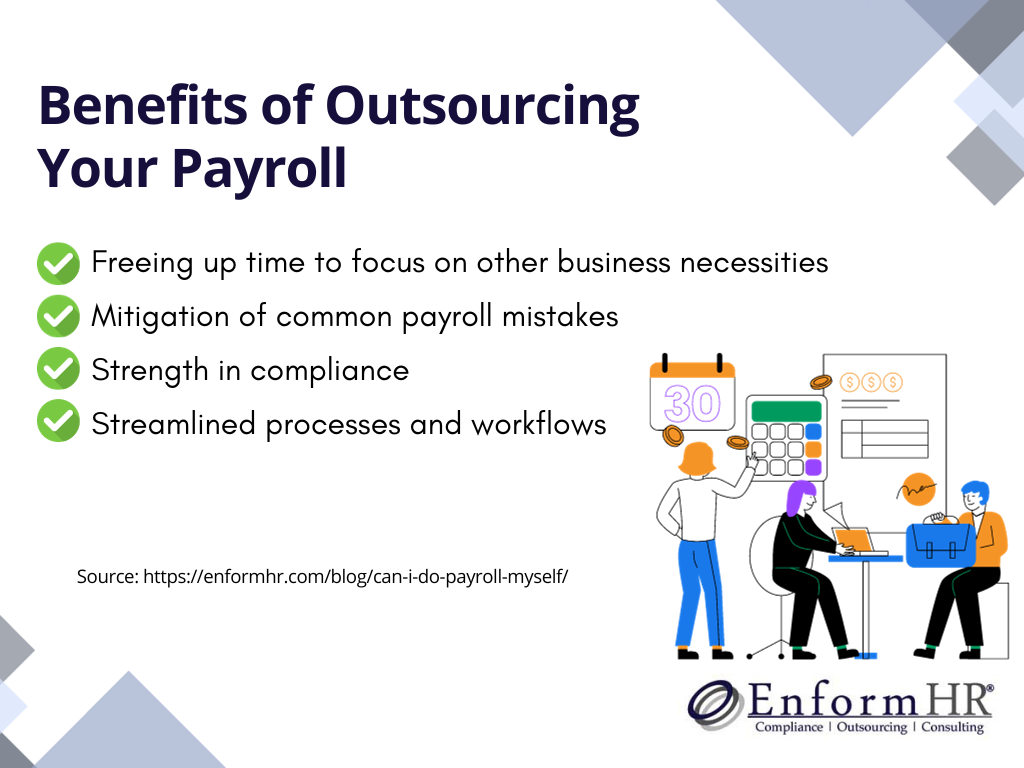Should You Manage Your Own Payroll?

The intricacies of processing and managing payroll are often much more than most people think. As a business owner, you may be wondering if you can handle the time and energy it takes to manage this integral business process.
The answer here is it depends. For example, I can fix my water heater, but I reckon that if I remove a screw I shouldn’t, I could end up in some deep waters… literally. Payroll contains some fine details such as withholding federal, state, and local taxes, sending those payments to the IRS and your state, filing tax returns, calculating overtime, managing benefits deductions, complying with multi-state laws and federal regulations, and properly maintaining payroll records.
Consequences of Payroll Mishaps
Even if all of that sounds doable, it’s important to consider the possible consequences of payroll mishaps.

Impact of Incorrect Payment on Employees
One of the more common payroll mishaps is when your employees aren’t paid on time or paid incorrectly. It may be safe to say that if employees aren’t paid correctly, it could lead to frustration, mistrust, and even turnover. Employees also may think such a mistake is worthy of a scathing review on social media, which could do real damage to your company’s reputation.
Financial Implications for Businesses
Mishaps can also be extremely costly for business owners. Miscalculations in timekeeping, incorrect employment tax rates, the timing of final paychecks for terminated employees, and managing the allocation of Paid Time Off, including vacation time, sick time, and leave, can result in fines, penalties, interest charges, even legal action.
The Hidden Costs of DIY Payroll Management
Penalties and disgruntled employees aside, doing your own payroll can also be intangibly expensive. Processing payroll can be time-consuming, and when mistakes happen, it can be even more so. And since payroll often affects other branches of business, such as Human Resources and Benefits Administration, errors can have a snowball effect that leaves multiple team members running interference instead of focusing on more pressing business priorities such as increasing revenue or attending to customer needs.
Legal and Compliance Aspects of Doing Payroll

When it comes to doing payroll yourself, it’s important to understand that there are legal and compliance aspects involved. Failure to comply with the necessary laws and regulations can similarly result in hefty penalties and legal consequences. Here are some key factors to consider:
A. Laws and regulations governing payroll
There are various laws and regulations that govern payroll, including the Fair Labor Standards Act, the Family and Medical Leave Act, and the Equal Pay Act. It is crucial to familiarize yourself with these laws to ensure that your payroll practices are in compliance.
B. Tax obligations and deadlines for payroll
As an employer, you are responsible for withholding and remitting payroll taxes on behalf of your employees. It is essential to stay updated on tax rates and deadlines to avoid penalties. As mentioned, there can be financial implications if you fail to meet these obligations, including fines, interest charges, and legal action.
C. Necessary forms to fill out for legal compliance
Completing the required forms accurately is essential for legal compliance. These forms include employee’s W-4, I-9 for employment eligibility verification, and state-specific forms. Keeping detailed records of these forms is crucial to ensure compliance in case of audits or legal disputes.
D. Potential penalties for non-compliance with payroll regulations
Fines, penalties, and interest charges as a result of non-compliance can quickly add up, which can impact your business’s finances, and in more serious cases, impact your business’s reputation and leave you exposed to potential liabilities.
By understanding and adhering to the legal and compliance aspects of doing payroll yourself, you can ensure that your business remains compliant and avoids unnecessary penalties or legal issues.
Benefits of Outsourcing Your Payroll

When it comes to payroll, just like fixing a water heater, you may want to call in a professional to help. Benefits of outsourcing your payroll functions include:
- Freeing up time to focus on other business necessities
- Mitigation of common payroll mistakes
- Strength in compliance
- Streamlined processes and workflows
Though there are fees associated with the services of payroll providers, they can pale in comparison to the cost of fines, penalties, and time spent as a result of avoidable mistakes. Likewise, many key elements of processing payroll, such as tax filing, year-end processes such as W-2s, new hire reporting, and record retention, can be taken off your plate.
Making the Decision

Every business decision comes with pros and cons, and deciding whether to process your own payroll or not is no different. If you’re thinking about outsourcing some or all of your payroll functions, you should always make sure all of your business needs can be met.
At EnformHR, our Human Resources Consultants come with reputable payroll expertise that can help your business meet its goals. Contact us today for a consultation and to find out how partnering with one of our Human Resources Consultants can help your business.


